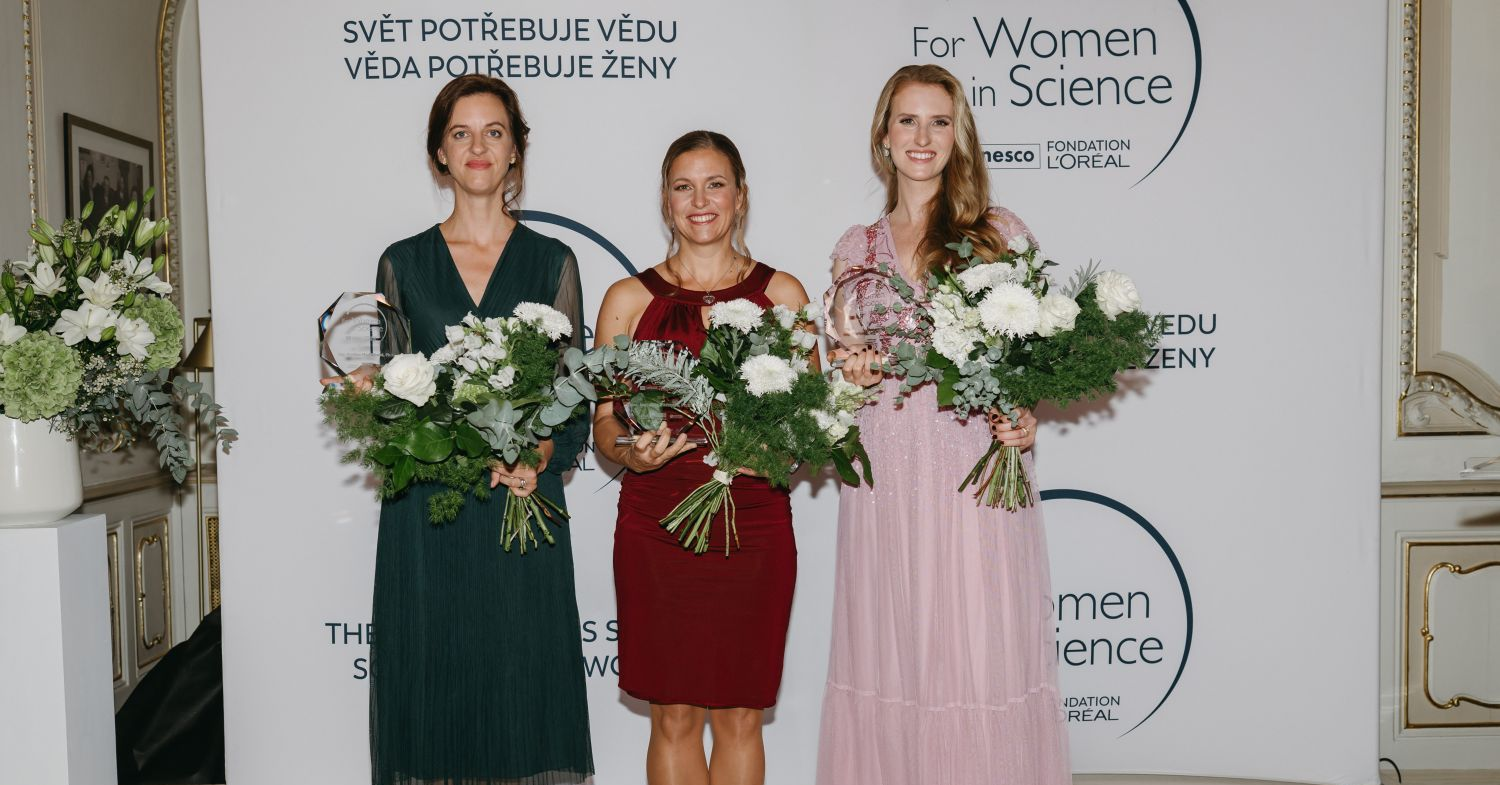
Jitka Viktorová wins L'Oréal-UNESCO For Women in Science 2025 Award for her fight against a silent pandemic
Middle: Assoc. Prof. Ing. Jitka Viktorová, Ph.D. (UCT Prague), left: Ing. Pavlína Modlitbová, Ph.D. (Czech Academy of Sciences), right: Ing. Markéta Hujerová, Ph.D. (Technical University of Liberec) – Photo: Filip Jägr
Czech scientists receive prestigious L'Oréal-UNESCO For Women in Science awards
The International Awards L’Oréal and UNESCO For Women in Science (FWIS) program was established 1998 to recognize outstanding female scientists and to support women at the beginning of their scientific careers. The program also draws attention to the low representation of women in science and the importance of equal opportunities for the development of the entire scientific community. Since its inception, more than 4,400 women have been honoured in more than 140 countries around the world, including the Czech Republic, where the program has been held annually since 2006.
In this year’s nineteenth competition, three Czech scientists were granted awards, among them Associate Professor Jitka Viktorová, a researcher from UCT Prague’s Dept. of Biochemistry and Microbiology who focuses on one of the most pressing problems in contemporary medicine: bacterial resistance to antibiotics.
Award to support ongoing research
Antibiotic resistance is one of the greatest global health threats of the twenty-first century. A research team led by UCT Prague’s 2025 awardee is working on innovative methods for overcoming bacterial resistance and restoring the effectiveness of antibiotics. The team’s priority is the development of adjuvant therapies that combine existing drugs with substances capable of blocking bacterial defence mechanisms.
This research leverages modern biochemical and microbiological methods to identify key enzymes that cause resistance, also testing inhibitory substances that could improve treatment outcomes and slow the spread of antimicrobial resistance. Her work thus helps to predict the response of cells to therapy and restore their sensitivity to antibiotics as well as anticancer drugs.
“The World Health Organization estimates that in 2050, more people will die from antibiotic resistance than from cancer, and this is definitely worth paying attention to,” Associate Professor Viktorová told Vědavýzkum.cz, a Czech R&D news portal.
Supporting scientific collaboration and sustainability
The success of FWIS awardees confirms the growing importance of interdisciplinary collaboration between scientists across disciplines in the Czech Republic and abroad. The financial support provided by the award enables the expansion of research capacities and investments in key experimental phases that are not typically included in grant funding.
The importance of the award for the scientific community
The For Women in Science program not only highlights individual women’s scientific excellence but it also motivates young women to choose a scientific career. Every year, the program attracts more and more attention while confirming that female Czech scientists count themselves among the leading experts on the international stage.
UCT Prague is proud to be part of this initiative, which supports scientific development and equal opportunities in academia.
Below you will find a follow-up interview with UCT Prague’s awardee in which she shares her impressions of the award ceremony, her experience in taking part in the competition, and her personal opinions about combining a scientific career with family life.
What were your first impressions as a For Women in Science awardee and what does your award mean to you?
My first impressions were definitely humility and gratitude. I see this award as a great commitment and testament to my research group, department, and university. I have raised the bar a little higher and I hope I will still be able to jump over it for some time. I feel special gratitude for my family and the members of the research team engaged in these investigations.
Your topic of research is bacterial resistance to antibiotics. What makes your project unique and why do you think it was selected over other topics?
This topic is very pressing and topical. Antibiotic resistance is referred to as a silent pandemic. The World Health Organization identifies it as one of the ten global threats that humanity currently faces. The Czech Republic’s National Action Plan emphasizes the search for alternative approaches to the treatment of infections caused by resistant bacteria.
Our project deals with the development of resistance to adjuvant therapy. Adjuvant therapy combines an antibiotic and an adjuvant (an adjuvant is a specific inhibitor of the bacterial resistance mechanism to a given antibiotic). Our hypothesis assumes that resistance to adjuvant therapy will develop significantly more slowly than without the therapy, if at all. This could make adjuvant therapy a very effective tool in the fight against antibiotic resistance.
You became one of three Czech FWIS laureates selected from more than 60 applicants. What was the atmosphere like for the awardees at the ceremony?
Both Markéta Hujerová (Technical University of Liberec) and Pavlína Modlitbová (Czech Academy of Sciences) are incredibly strong and unique women. It was an honour to meet them. We also found possible ways in which we can collaborate, so I am very excited to see what the future holds.
Not only do you represent women in science, but you are also a mother twice over. How did you manage to combine motherhood and your career?
Honestly, I don’t know if I'm doing it well; only time will tell. The beginnings were definitely very challenging. Before your children enter school, no one cares if a meeting with a doctoral student runs late or if you got stuck in traffic. Instead of passing out on the couch after a hard day in the laboratory, you have to muster up your last bit of strength and do your housework, sign progress reports from teachers, come up with snacks and dinners, do the laundry, tidy up, read a bedtime story… But after that, things start to improve and you see that your children are starting to benefit from your job. They start going to conferences with you, getting to know other countries (and especially languages), they invite you to school to tell about your work… All this is definitely a big advantage for their futures. Now my children are already grown-ups; one of them is studying in France. But it definitely required a lot of patience and understanding on their parts along the way.
What would you change in the system to make combining motherhood with a career easier?
I think that things are improving a lot in this regard. I really appreciate UCT Prague’s involvement in the European Commission’s Gender Equality Plan (GEP) and specific UCT support such as the Zkumavka (test tube) childcare center, the Julia Hamáčková Prize, and the Dagmar Procházková Fund. And last but not least, I am very excited about the new Czech Science Foundation’s Restart program (part of the Returns call for grant proposals), which should give researchers financial support after life events forcing one to pause one’s career (e.g., maternity or parental leave, after a long-term illness or caring for a sick loved one). I see an understanding and supportive attitude from one’s supervisor and workplace manager as crucial. Of course, support for postdocs is also critical, and in this, we are still far behind other countries.
You also received financial support with this award. What are you planning to do with it?
I would like to use some of the funding for my self-development. I am transitioning to being more of a manager than a researcher, so I would like to improve my ability to manage larger teams, which is a challenge for me right now. I am also considering participating in a prestigious international conference on antibiotic resistance held every two years in the US.
Part of my award will also go to my two almost-adult daughters, because I would like to give them a token of appreciation for their patience and incredible support throughout my career. Jokingly, I said that I would subscribe to Czech grocery delivery company Rohlik.cz on their behalves so that they too can experience what fresh pastries taste like when I am late for work again. Being a mother in science is not easy at all, so I would like to create an experience for my daughters to thank them.
What would you say to young scientists and to young men?
Don’t worry! If you don’t knock on the door, it won’t open.
And what would you say to their supervisors?
Pass it on! There is a really nice book called Pay It Forward by Catherine Ryan Hyde in which children are given the task of figuring out how to change the world. One boy comes up with a brilliant idea: he does three good deeds and instead of wanting payback for them, he asks those he did good for to pass the good deed on. And that is how I think the world should work. That is why every supervisor should realize that they alone are not the sole reason for their success but there were people who helped and believed in them along the way. And they should pass good deeds on to the next generations.
The partners of this year’s three awardees are all named Jan. What else do they have in common?
Certainly, a great amount of tolerance, patience, and understanding. But I would also venture to guess that they are all good at cooking dinner and doing housework.
Another awardee mentioned business partners and collaborations with other institutions. Have you collaborated with anyone outside UCT Prague?
An enthusiastic “yes”. I think that networking is what makes high-calibre science. If a scientist can take off their blinders and admit that someone else understands something better, they can significantly advance their own research. We are not very good at collaborating with business partners yet, but we have a number of both Czech and international collaborations in basic research. Each of these collaborators is unique in some way, helping us to move forward. I greatly appreciate all colleagues who are willing to share their samples, know-how, and instruments with us. Those who are willing to help us achieve common goals, lend a helping hand, and write a joint grant proposal.
Scientific work is often a long-distance race. What gives you perseverance when experiments fail?
I am glad you mentioned that it’s a long-distance race. To extend the metaphor, I would add that there are dead ends and obstacles as well. One must realize that any award, publication, or result is not the work of only one individual; a team of people always stands behind these accomplishments. And I have been incredibly lucky with the people around me all my life. All my close colleagues are incredibly inspiring, energetic, smart, full of enthusiasm and a desire to embark on any joint project. I really appreciate their support and energy, which often appear just at the right time.







